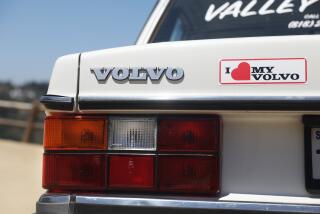Ode to a dead Volvo
An occasional series on getting from here to there.
--
It was a 1988 Volvo station wagon, silver gray, turbo. We bought it used, one owner, in 1996 for $12,000, and we were lucky. We had another Volvo at home, a snappy red 850 (1993), which had a kind of Viking joie de vivre, if Scandinavian cars can be said to have joy in life. We thought of it as female: We named her Freya. When we brought the station wagon home, it was clear he was more patient, less a Viking than a modern Swede, a socialist perhaps, and so we named him Oskar.
Oskar was my car. The first time he and I went on a longish trip, it was from Santa Barbara to Los Angeles with a friend in heavy rain. We hit rush-hour traffic on the Pasadena Freeway’s narrow lanes and bad curves, and Oskar drove like a draft horse, pushing through the squalls and the waves from trucks, mowing past drowned sports cars.
When my brother was dying in New Mexico and I flew back and forth out of LAX, and then drove home, often late at night, I had to remember to keep my hands on the wheel, so sure was I that Oskar was in charge.
Oskar was comfortable. The leather seats were high and reclined, like Eames chairs. When I drove north to San Francisco the first time with a friend, she said, “It’s like driving in a living room.”
Nothing ever went wrong with Oskar. A few small things had to be replaced: hoses, brake linings, a wiper. Regularly, our mechanic, Steve, who had an old dog that used to lie outside his garage on a cushion, would pat Oskar’s hood and pronounce him “good.” I took the car in for a 3,000-mile check and thought he would last forever.
I killed him. In my busy life, I ignored the smell of oil for two days. I had a list of things to do the day of Oskar’s death, and dropping him off at Steve’s was not among them. And so on the freeway, I heard a fluttering sound, as if a flag was inside Oskar’s hood, and looked out the rear window to see black smoke blooming from the tail pipe. I pulled over, but not soon enough.
After the tow, Steve met with me over the body. “That engine got hot,” he said, and looked at me as if I had shot his dog. I felt I practically had done exactly that. This car, so patient, so reliable, so destined to last for more than 200,000 miles, had died an early death at 158,619 because of my neglect.
And now I don’t know what to do. I mean, the decision to buy another car is freighted. It’s not only new versus used, and cute versus practical, and what we can honestly afford versus a lark, it’s gas mileage, gas mileage, gas mileage.
And so I am faced with ... a Prius? I know there are many who love them. A friend wanted to sleep in hers the day she brought it home, but somehow, I, having known Oskar, cannot bring myself to love a car that crows about its technology: that TV screen advertising its energy consumption, that rear-view video camera and odd, button-like shift. (And isn’t there something a little preachy about them?) My Oskar was self-effacing.
Perhaps it’s too early; I should mourn. A car is more than its technology, more than its gas mileage. It’s all the places you went together, all the ways it served you and, finally, who it was.






